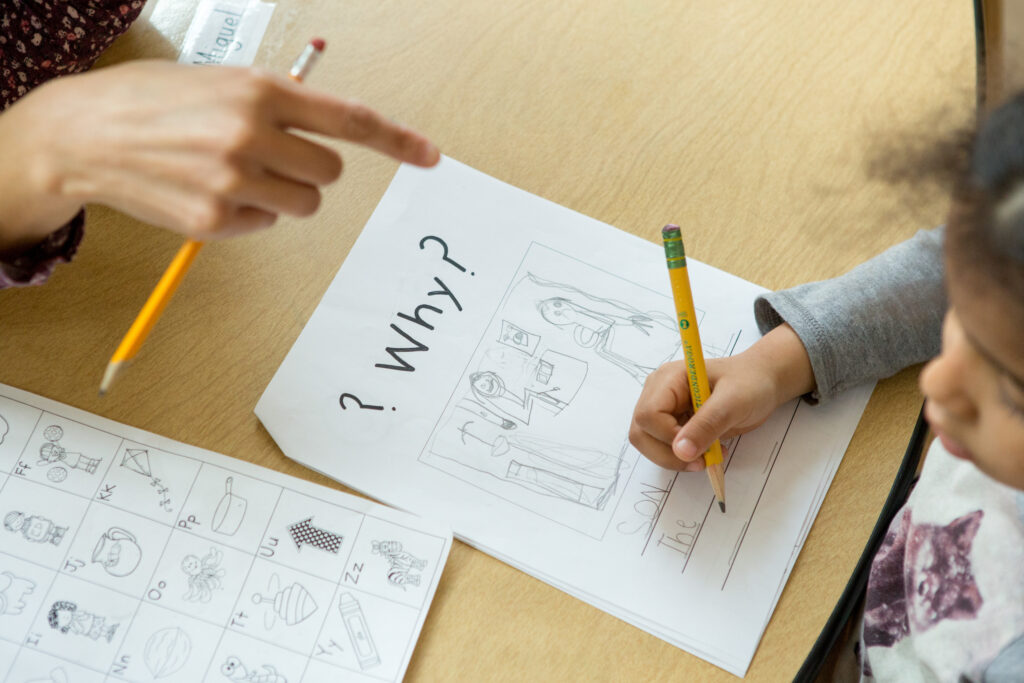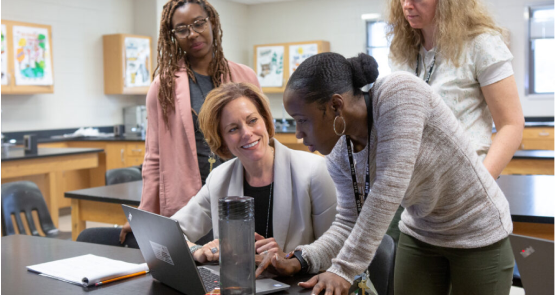The internet offers a wealth of resources for learning and social connection. But it also can expose impressionable young people to false information that can undercut their education. To be successful learners, kids and teens need to be savvy critical thinkers.
In their adolescence, young people can further their critical thinking skills by engaging with arguments and issues in their everyday lives. Here are seven actionable steps to support kids’ critical thinking, even among teens and pre-teens.
Build your young child’s natural curiosity by helping them explore and develop these questions. If they ask why red lights are red, ask them what reasons they can come up with. This is the beginning of learning to imagine alternative possibilities, consider other views, and build arguments. With young kids, under the age of nine, these early arguments are, of course, not likely to be airtight, but that’s okay. The practice in reasoning, articulating their views, and giving reasons is invaluable. Resist the urge to give them simple answers and encourage them to begin asking more questions and trying to answer them on their own.
Completely cleansing tech of misleading and false information and addictive apps is not an option, certainly not for teens, and overly strict controls can backfire and make kids resentful and more likely to develop bad habits when they finally are exposed to the unfiltered internet. It’s key to find the right balance and to work with your kids as a tech mentor — guiding them toward healthy online habits.
One thing parents and mentors can do is to model good research skills in their everyday media engagement. When reading an article or learning new information, verbally express curiosity through follow up questions on the purpose and possible biases of the source. Modeling this evaluation will reinforce the importance of healthy skepticism and your child will internalize these questions for future independent analysis.
Adults can also directly involve young people in this sort of analysis and help kids become better critical thinkers. After watching a documentary together or listening to the news, parents or mentors should ask young people to respond to the media they’re absorbing. Ask questions like:
As kids grow, they develop more long-term interests, pursuits, and dreams. But to channel these interests in productive ways they need to learn to spend time reflecting on what’s important to them and set ambitious, but realistic, long-term goals. This is key, not just for their general development, but for their critical thinking.
Without a final goal or objective, your child might lose motivation or direction. This process should begin with questioning and self-reflection. Even beginning at a young age, children are capable of discussing what’s most important to them, whether it be expressing themselves artistically, helping others, or improving some aspect of our society.
Encourage them to translate those values to realistic near-term projects and goals. These should go beyond the external metrics for success that they might be used to in school. There’s no grading scale here!
Push kids to think through a personal objective for the project outside of scholastic fulfillment. Will they have acquired a new skill at the end? Is there a credential they can earn? Will they build or create something? Will they help improve people’s lives? Establishing goals will exercise their critical thinking muscles as they consider abstract values and desires, and figure out how to translate them into concrete, actionable goals.
When setting goals, in a project or in life, it’s also important to create plans for meeting those goals. Advise young people to break up big, long-term goals into small, reachable goals. At these checkpoints, encourage your child to evaluate their own progress and satisfaction. This planning process will build confidence and determination. They’ll gain invaluable skills in critically assessing their progress and mapping appropriate next steps.
As they pursue these goals, they’ll of course experience setbacks, obstacles, and disappointments. At certain points, they’ll have to change the plan, reorganize checkpoints, or even start from scratch. When young people become dissatisfied with their work, they tend to disengage, but metacognition and critical thinking can help them avoid disengagement and build resilience.
First of all, adults can help by asking them to step back and ask what failures, setbacks, or dead-ends actually mean? We have all experienced the temptation to take these things personally. It can seem like the world is against us or we’re just not good enough. These feelings can be felt particular strongly by young kids who may not have developed robust competencies yet.
Help them think through obstacles rationally. They usually don’t mean as much as we might think. Discuss why a particular strategy or effort didn’t work. How can it be improved? Was it just a matter of bad luck? What new goals can be set and pursued?
This psychological process is essential for critical thinking skills. Additionally, diving into a topic that they are passionate about can help them develop their own perspectives on issues. Having such a starting point is essential for young adults beginning to sharpen their critical thinking skills, and will aid them as they transition into higher education and the workforce.
The confidence and self-sufficiency that critical thinking skills instill can help older children feel like they are heard and respected by their peers and adults. In feeling valued, they are also more likely to feel connected to the family and community more broadly.
Kids are in constant tension between their desire to be independent and a need for their guardian’s support, academically, financially, and emotionally. As they learn more about the world around them and develop independent ideas and values, it is essential that loved ones engage and show interest in their ideas.
With older kids and teens who’ve already developed their own inchoate perspectives, it can be easy to come across as dismissive. Keep in mind that they are still negotiating their belief systems and developing reasoning skills. Even if your teen’s attitude seems extreme — or even personally hurtful to you during arguments — it is important to try to take their feelings and thoughts seriously without getting defensive.
At the same time, it is important that adults push young people to develop their reasoning skills as part of this engagement.
Critical thinking skills are essential for guiding children and teens into full independence, but they also build relationships. The confidence and self-sufficiency that critical thinking skills instill can help older children feel like they are heard and respected by their peers and adults. In feeling valued, they are also more likely to feel connected to the family and community more broadly.
One step parents and mentors can take to ensure their teens feel valued is by simply asking for their input on a problem. For example, if you’re discussing how to best care for an aging grandparent, you might ask your child what they think is best. Encouraging them to answer with clear reasons pushes them to synthesize information, therefore improving their argumentation skills. Simply asking for their input is also critical for establishing open, trusting lines of communication. They also, of course, are likely to have good and useful ideas!
Growing up is full of growing pains. But critical thinking skills can give children the tools for achieving independence and building trusting relationships, while also giving parents peace of mind in the knowledge that their child can approach and evaluate anything that comes their way. Ultimately, the critical thinking skills developed in childhood and adolescence will give students the foundation to achieve success, find personal fulfillment, and engage with confidence in adult society.







